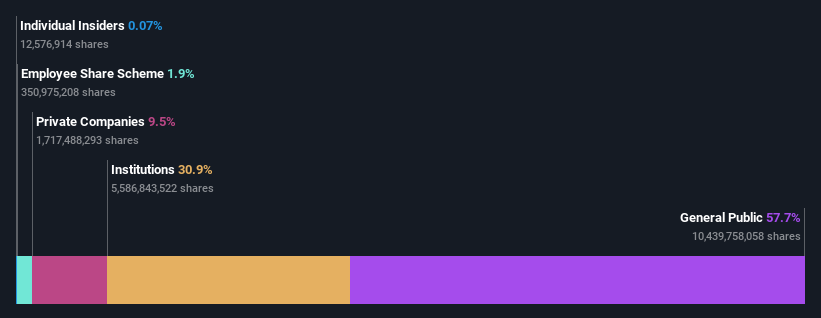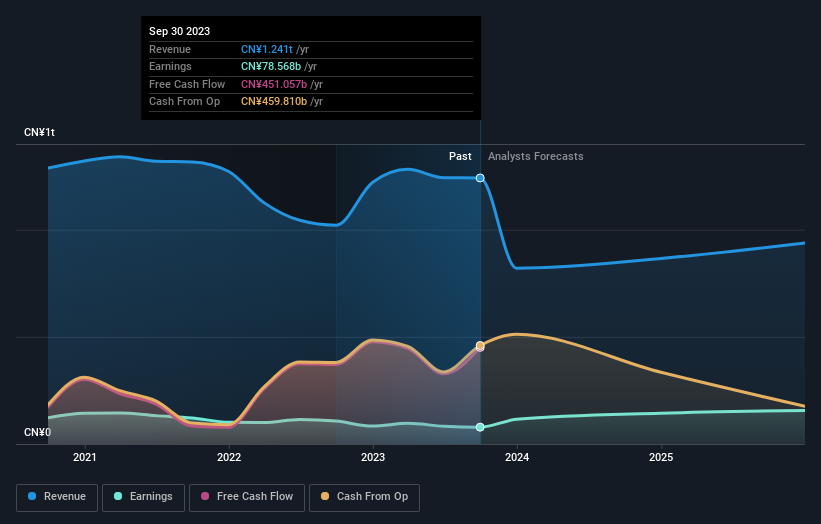Stock Analysis
Ping An Insurance (Group) Company of China, Ltd.'s (HKG:2318) market cap dropped HK$50b last week; individual investors who hold 58% were hit as were institutions

Key Insights
- Ping An Insurance (Group) Company of China's significant retail investors ownership suggests that the key decisions are influenced by shareholders from the larger public
- A total of 25 investors have a majority stake in the company with 33% ownership
- Institutional ownership in Ping An Insurance (Group) Company of China is 31%
A look at the shareholders of Ping An Insurance (Group) Company of China, Ltd. (HKG:2318) can tell us which group is most powerful. We can see that retail investors own the lion's share in the company with 58% ownership. That is, the group stands to benefit the most if the stock rises (or lose the most if there is a downturn).
While institutions, who own 31% shares weren’t spared from last week’s HK$50b market cap drop, retail investors as a group suffered the maximum losses
In the chart below, we zoom in on the different ownership groups of Ping An Insurance (Group) Company of China.
View our latest analysis for Ping An Insurance (Group) Company of China

What Does The Institutional Ownership Tell Us About Ping An Insurance (Group) Company of China?
Institutional investors commonly compare their own returns to the returns of a commonly followed index. So they generally do consider buying larger companies that are included in the relevant benchmark index.
As you can see, institutional investors have a fair amount of stake in Ping An Insurance (Group) Company of China. This implies the analysts working for those institutions have looked at the stock and they like it. But just like anyone else, they could be wrong. It is not uncommon to see a big share price drop if two large institutional investors try to sell out of a stock at the same time. So it is worth checking the past earnings trajectory of Ping An Insurance (Group) Company of China, (below). Of course, keep in mind that there are other factors to consider, too.

We note that hedge funds don't have a meaningful investment in Ping An Insurance (Group) Company of China. Our data shows that Shenzhen Investment Holdings Co., Ltd is the largest shareholder with 5.3% of shares outstanding. Meanwhile, the second and third largest shareholders, hold 3.0% and 2.6%, of the shares outstanding, respectively.
A deeper look at our ownership data shows that the top 25 shareholders collectively hold less than half of the register, suggesting a large group of small holders where no single shareholder has a majority.
While studying institutional ownership for a company can add value to your research, it is also a good practice to research analyst recommendations to get a deeper understand of a stock's expected performance. Quite a few analysts cover the stock, so you could look into forecast growth quite easily.
Insider Ownership Of Ping An Insurance (Group) Company of China
The definition of an insider can differ slightly between different countries, but members of the board of directors always count. The company management answer to the board and the latter should represent the interests of shareholders. Notably, sometimes top-level managers are on the board themselves.
I generally consider insider ownership to be a good thing. However, on some occasions it makes it more difficult for other shareholders to hold the board accountable for decisions.
Our information suggests that Ping An Insurance (Group) Company of China, Ltd. insiders own under 1% of the company. However, it's possible that insiders might have an indirect interest through a more complex structure. As it is a large company, we'd only expect insiders to own a small percentage of it. But it's worth noting that they own HK$534m worth of shares. Arguably recent buying and selling is just as important to consider. You can click here to see if insiders have been buying or selling.
General Public Ownership
The general public, who are usually individual investors, hold a substantial 58% stake in Ping An Insurance (Group) Company of China, suggesting it is a fairly popular stock. With this amount of ownership, retail investors can collectively play a role in decisions that affect shareholder returns, such as dividend policies and the appointment of directors. They can also exercise the power to vote on acquisitions or mergers that may not improve profitability.
Private Company Ownership
We can see that Private Companies own 9.5%, of the shares on issue. Private companies may be related parties. Sometimes insiders have an interest in a public company through a holding in a private company, rather than in their own capacity as an individual. While it's hard to draw any broad stroke conclusions, it is worth noting as an area for further research.
Next Steps:
It's always worth thinking about the different groups who own shares in a company. But to understand Ping An Insurance (Group) Company of China better, we need to consider many other factors. For example, we've discovered 2 warning signs for Ping An Insurance (Group) Company of China that you should be aware of before investing here.
If you would prefer discover what analysts are predicting in terms of future growth, do not miss this free report on analyst forecasts.
NB: Figures in this article are calculated using data from the last twelve months, which refer to the 12-month period ending on the last date of the month the financial statement is dated. This may not be consistent with full year annual report figures.
Valuation is complex, but we're helping make it simple.
Find out whether Ping An Insurance (Group) Company of China is potentially over or undervalued by checking out our comprehensive analysis, which includes fair value estimates, risks and warnings, dividends, insider transactions and financial health.
View the Free AnalysisHave feedback on this article? Concerned about the content? Get in touch with us directly. Alternatively, email editorial-team (at) simplywallst.com.
This article by Simply Wall St is general in nature. We provide commentary based on historical data and analyst forecasts only using an unbiased methodology and our articles are not intended to be financial advice. It does not constitute a recommendation to buy or sell any stock, and does not take account of your objectives, or your financial situation. We aim to bring you long-term focused analysis driven by fundamental data. Note that our analysis may not factor in the latest price-sensitive company announcements or qualitative material. Simply Wall St has no position in any stocks mentioned.
About SEHK:2318
Ping An Insurance (Group) Company of China
Ping An Insurance (Group) Company of China, Ltd.
Established dividend payer and good value.


